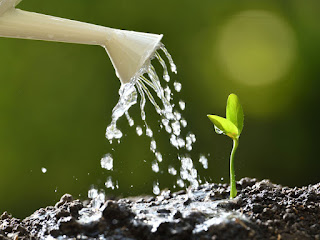A few times on the podcast I’ve compared the development of your mindfulness practice to cultivating a garden. You have to get your hands dirty and put it into practice a little every day if you want the flowers to bloom. Nowhere is this more true than in our emotional state.
As human beings we have future worries that make us feel anxious and regrets from the past that make us feel sad and angry. This is perfectly normal but the challenge arises when we water the seeds of those emotions - they can grow out of proportion and our lovely garden is covered in brambles.
What do we mean by watering the seeds? In the practice of mindfulness, the little choices that we make every day water different seeds. Some choices water the seeds of joy and freedom, we want to do more of this. Some choices water the seeds of resentment and fear, we want to do less of this. A lot of the time we don’t realise that we’re doing it - for example if we choose to stay up late rather than getting a good nights sleep we’re watering the seeds of our difficult emotions. Drinking too much caffeine or alcohol can do this, as can reading social media or articles or watching TV.
Only you can know the choices you make that water the seeds and this has to start with awareness. Train yourself to practice awareness as much as you can through the day, you can do this my setting an hourly chime on your phone where you stop, breathe and notice the choices you have in front of you, so rather than being on autopilot you can make an active decision that waters the seeds of happiness. This can include, meditation, yoga, spending time with a friend, painting - the things that you enjoy doing that bring you back to the present moment and your current experience rather than distracting you.
Of course, even with a strong practice, difficult emotions arise. We’re not robots and its not reasonable to expect yourself to be calm and happy all the time. But when we notice, fear, sadness or anger arising we can choose to be kind to ourselves and tend to these feelings with love and compassion.
Thich Nhat Hanh says, 'there you are, my old friend,' when a difficult emotion arises. We can smile to our anger, smile to our fear and even our sadness; welcome them in rather than shut them out. Listen to what they have to say without agreeing, disagreeing or judging. Sitting with them like you would a friend who was upset; and when they’re ready, allowing them to leave your awareness. We have so much to learn from our difficult emotions and all they exist to do is help us, protect us and ultimately keep us safe and happy. Its only when we don’t listen that these powerful emotions take the reins and start driving our actions.
When we’ve become calm again, the next stage is to look at the roots of our anger - if a particular situation or set of words make us feel angry, we can look deeply inside ourselves to find the circumstances that led to feeling this way in this situation. It might be that a difficult experience or someone we had a relationship with in the past has led to assumptions and belief that lead us to react. When we find that, seeing it clearly, not judging that experience or ourselves. Although challenging, this can allow us over time to liberate ourselves from our suffering - and our garden can bloom.

Comments
Post a Comment